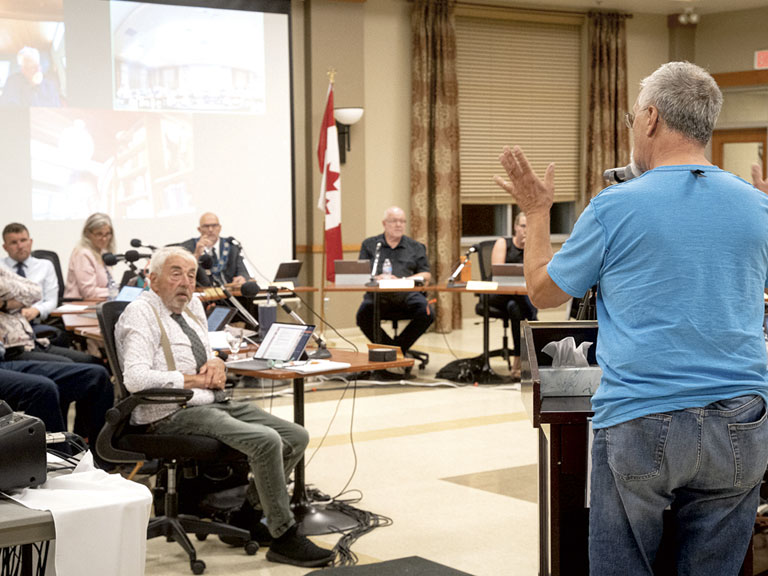County News
Plot twist

Water story takes a midnight turn
It was a council meeting unlike any other in Prince Edward County. Hundreds of residents jammed into the Highline Hall, spilling into the Rotary Room and beyond. They were in a mood. Some cheers, some boos, some outbursts of spontaneous laughter. All of it punctuated by the mayor repeatedly clacking his gavel insisting on better behaviour from the gathering. Three uniformed police officers patrolled the aisles—a visible presence to encourage order.
But residents wanted Council to hear them—for once. To listen. And maybe, just maybe, some did.
WHAT WAS DONE
Five and a half hours after Mayor Steve Ferguson gavelled the meeting to order, Council had made two decisions. It approved a wastewater pumping station at the top of Wharf Street in Wellington costing $6.1 million. It also approved the awarding of a tender for the design of a regional water plant in Wellington to accommodate potential new homebuilding growth in the village and Picton and Bloomfield—conditional on the successful receipt of an $18.3 million provincial grant. It means the design tender won’t proceed unless the grant application is successful.
But these were likely the least significant outcomes of this council meeting. As the session approached the midnight hour ,Councillor Corey Engelsdorfer raised his hand. The Wellington councillor wanted a stop to any more movement on this project until more rigour, more discipline and more expertise was applied to the major infrastructure project. He needed a clear cost recovery plan and a defined financing plan.
“We need to grow the community, I understand that,” started Engelsdorfer. “I appreciate all the time staff have given me over the past couple of years to bring me up to speed. I can see merit in the case to bring fresh clean water from Wellington to Picton.
“But as much as I have tried, I don’t see a sound financial plan that makes it viable.”
Originally framed as a deferral of all work including the design of a new water plant, the Wellington councillor’s motion met sharp and agitated resistance. Two councillors, Councillors Maynard and Hirsch, attempted to derail the initiative on procedural grounds. Meanwhile Mayor Ferguson and Councillor Phil St-Jean frantically painted a picture of a darkness upon the land should the Wellington councillor’s motion succeed.
“This isn’t pressing pause!” stressed Councillor St-Jean. “No, you are stepping on the brakes and coming to a screaming stop. This is not the right thing to do.”
No one expected what happened next. Not residents. Not developers. Not council members. All eyes turned to the County manager.
“I actually agree with this motion,” said Chief Administrative Officer Marcia Wallace. “I think this is exactly how we should proceed. And we have been listening.”
A hush fell over the crowd—uncertain where this was going.
The CAO proceeded to recommend changing the phrase “defer the project” to “defer construction” to enable the design work to proceed. Had CAO Wallace left her remarks at that, many would be right to worry that the County manager was merely saying the words necessary to get the tender across the finish line.
But Wallace had more. A lot more. Among the points made in Engelsdorfer’s motion was that Picton’s Master Servicing Plan should be completed and development charges be produced to enable waterworks development to pay for the infrastructure. That this work should be done before any more work happens. Again CAO Wallace agreed, unconditionally, with the Wellington councillor.
“We’ve never been given direction from Council to do a development charges study in Picton and Bloomfield,” explained Wallace. “We know this has to be redone. There is a report in the Thursday’s Committee of the Whole agenda to get that direction. I agree those milestones must be done and quickly.”
The CAO went on.
“Program management? Absolutely. We’ve never done anything in this municipality of this size,” said Wallce. “And it absolutely needs to be managed properly. We are in conversations with Colliers, a major project management firm, to talk about what they could possibly do—and what a project management structure might look like for long-term care and wastewater. We have to do it. We have to have boots on the ground. We’ve managed many smaller projects, but we’ve not managed something at this level of complexity. It absolutely needs to be properly managed. Including risk dependency.
“When it comes to cost recovery management, absolutely, that all has to be done,” continued Wallace. “And it hasn’t come to Council yet. I agree that this has to be done before any construction projects begin.
“I agree with all of this,” said CAO Wallace. “I agree this is the way a project should be managed. Given the scale and scope of this project.”
Councillor Engelsdorfer agreed to change the wording to “defer construction”.
“I want to see this put in place,” said Engelsdorfer. “Regardless of whether the tender gets approved or not. I believe this needs to be put in place.”
Suddenly, the entire landscape had shifted. Council voted in favour with only two dissenters—Councillors Roberts and MacNaughton.
It was a new day.

Comments (0)